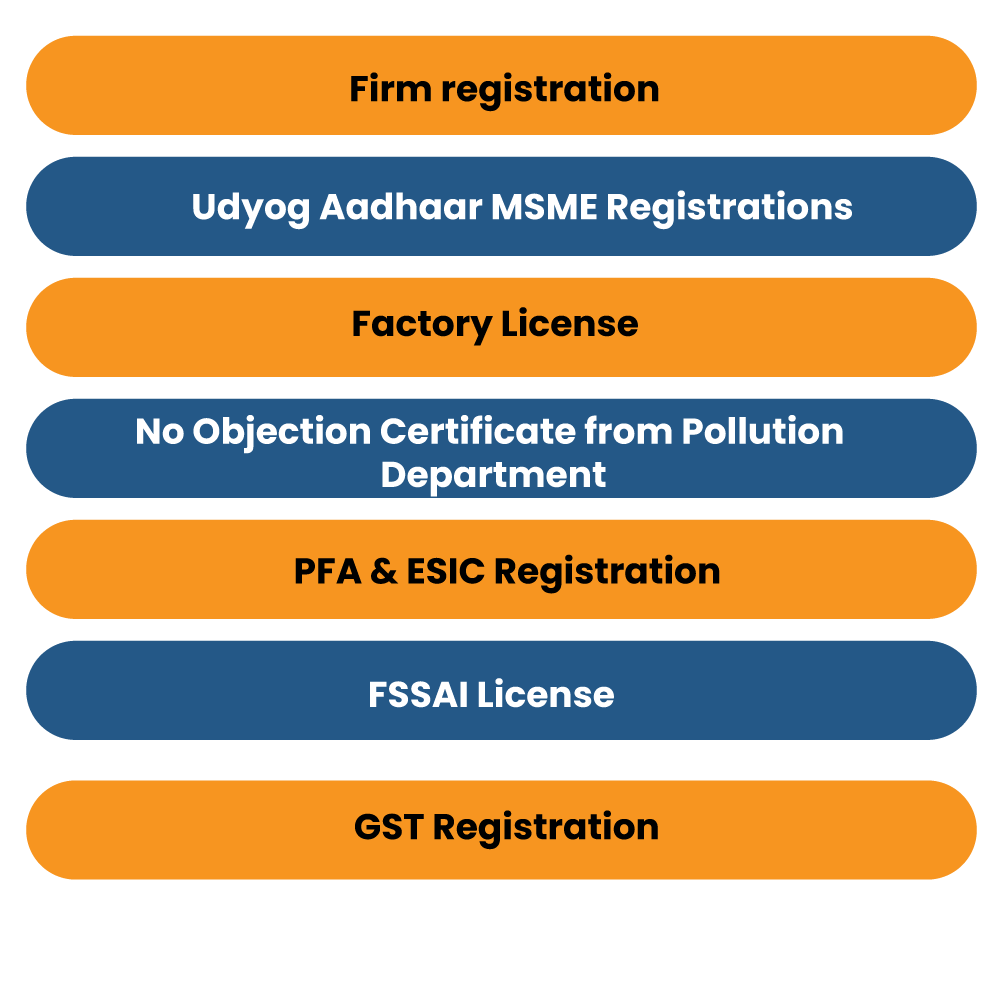Rice is one of the most important commercial food crops by far, and it is consumed by half of the world’s population. The annual yield of Rice is approximately 535 million tons. China and India are the prominent Rice producers as they contribute to 50% of the world’s total production.
The export of Rice in Southeast Asian countries is relatively low, and their collective annual production rate stands at 9-23 million metric tons. More than 300 million acres of land in Asia is utilized for growing Rice. The term Rice is a synonym for food in the Asian culture owing to its whopping production. Setting up a Rice Mill Industry in India requires an applicant to meet specific legal implications. The following sections in the article are completely focused on this matter.
Licenses to be Procured for Setting up Rice Mill Industry in India
To set up a Rice Mill industry in India, one has to avail licenses & permit from the respective state government authority.


Step 1: Firm registration
Firm registration is undoubtedly the first step toward establishing a legal entity in India. Depending on the scope of operation and capital investment, the business owners can select one of the following business models.
- One Person Company (OPC)
- Limited Liability Partnership (LLP)
- Private Limited Company
- Public Limited Company
Step2: Udyog Aadhaar MSME Registrations
Though Udyog Aadhaar MSME Registration is not mandatory in the prevailing scenario, it offers a host of productive benefits to the entrepreneurs, including rice mill industry owners. The prevailing MSME classification depended on the investment’s criteria in plant & machinery. Under the Aatmanirbhar Bharat Abhiyan, the government of India revised the MSME classification by inculcating composite criteria of both annual turnover & investment.
|
Revised MSME Classification |
|||
|
Criteria |
Micro |
Small |
Medium* |
|
Investment & Annual Turnover |
< INR1 crore & < INR5 crore |
< INR10 crore & < INR50 crore |
< INR50 crore & < INR250 crore |
Business owners seeking the establishment of rice mill industry in India can avail of MSME registration by making an online application on the following URL – https://udyamregistration.gov.in/UdyamRegistration.aspx
Step 3 – Factory License
Factory License is generally granted by the municipal institution of the respective state. Such a license comes under the ambit of the Factory Act. During online submission of the Factory License application, the applicant has to upload the following list of documents related to the site plan and firm.
- Form-1 (Particular of Room in the Factory)
- Certificate of Stability
- Questionnaire to Form-1
- No Objection Certificate from the respective pollution control board
- Process Flow Diagram
- No Objection Certificate of Fire
- No Objection Certificate from Local Authority
- Building Drawing Copy
- No Objection Certificate from Electrical Safety
- No Objection Certificate from Explosive Department
- Proof of Ownership related to factory building premises
- Notification of Site
- List of Directors
- Safety Report
- On Site Emergency Plan
- Memorandum & Article of Association
- Resolution for declaration of Occupied
- Health & Safety Policy
- Photograph of premises
- Identity Proof
- Treasury Challan/Bank Name
- DIN/PAN Card
Read our article:An overview on Audit from FSSAI
Step 4 – No Objection Certificate from Pollution Department
As per Section 25 of Water (Prevention and Control of Pollution) Act, 1974, any entrepreneur running an establishment that emits pollutant into water resources or surrounding is required to avail consent from the respective pollution control board in following two phases;
Consent to Establish (CTE): It refers to a No Objection Certificate granted by the State Pollution Board before setting up any industry or process.
Consent to Operate (CTO): One can avail Consent to Operate No Objection Certificate soon after the establishment of an industry or process plant. Such No Objection Certificates are subjected to periodic renewal.
Keep in mind that every state pollution board has it respective online portal that allows the applicant to file an online application for CTE and CTO. During application submission, you will be asked to furnish the following documents.
- Site proposal/index
- Geographical Map
- Descriptive illustration of the different process along with point sources of sewage emissions
- A Document highlighting Diesel Generator capability in KVA
- Details of instruments related to Water Pollution Control/Air Pollution Control
- Ambient Air Quality Report
- Non-Objection Certificate from Directorate of Industries located in respective states
- No Objection Certificate from Directorate of Industries Government of Maharashtra /SSI Certificate Maharashtra
- Certificate from DGTD (Director-General of Trade and Development) (if applicable)
- Details pertaining to chemical reactions with mass equilibrium
- Consent fees in the form of Demand Draft (DD) drawn in favor of respective Pollution control board.
- Chartered Accountant certificate or Undertaking on a stamp paper highlighting Capital Investment and Water Budget calculations
Step 5 – PFA & ESIC Registration
As per the prevailing Labor law, any registered establishment that has a workforce more than the prescribed threshold limit has to obtain PFA and ESIC registration for the employees without exception. The opening of PFA for employees becomes mandatory for a business owner in case if their Basic + Dearness Allowance is less than INR 15,000 per month.
The ESIC registration is mandated for the employees if the following conditions are met:
- If the existing strength of the workforce in the establishment is more than 10
- If the employee monthly income is less than or equal to Rs 21000
Step 6 – FSSAI License
FSSAI license is a must-have requisite for anyone who deals with the food business, including the rice producers. The application for an FSSAI license can be made online on the respective government portal along with a prescribed fee. During application filing, the applicant will be asked to upload the following basic documents
- Authorized person’s address proof
- Passport size photo
- Business name & address
- Nature of business details
- FSSAI declaration form
Soon after the application submission, the same will then forwarded to the respective authority for in-depth scrutiny. Keep in mind the request for registration can be revoked in case of non-compliance with the given FSSAI guidelines.
Step 7 – GST Registration
Obtain a GST number as it is mandatory for businesses who seek hassle-free interstate sales. For getting GST registration, one has to visit the official website and fill an online form. While form submission, the applicant will be prompted to upload some basic documents such as
- Company PAN card.
- The Ministry of Corporate Affairs incorporation certificate
- Memorandum/ Articles of Association (in case of a private and public limited company)
- Signatory’s appointment proof.
- Signatory’s PAN card.
- Signatory’s Aadhaar card.
- PAN card of all directors (in case of a private and public limited company)
- Address proof of all directors (in case of a private and public limited company)
Conclusion
It is obvious from the facts above that establishing a Rice mill industry in India is not a straightforward undertaking. There are plenty of legal requirements that one has to fulfill before starting the processing or production in the plant. With that said, the fact mentioned above can help you get your business running if you ensure conformity with the same.
Read our article:Validity of FSSAI License: Everything you Need to Know











